One of the most crucial aspects to the fast-evolving construction industry is the ability to maintain a competitive edge. The integration of artificial intelligence has consistently grown in a new era for industry, one that takes traditional methods and institutes smart, data-driven processes.
Revolutionizing the construction industry with artificial intelligence paves the way for smarter and efficient construction projects. This progress is more environmentally responsible as well as also reducing costs.
AI is a necessity for construction companies eager to thrive in the digital age. Improved safety, cost savings, and sustainability are just a few of the many advantages provided by AI.
Let's explore how artificial intelligence is paving the way for smart construction.
The Role of AI in Smart Construction
Emerging as a powerful and top tech trend in a variety of industries – one of the fields where Artificial Intelligence (AI) and machine learning is truly making an impact is construction. Thanks to AI, project planning, execution, and management are all being revolutionized, with efficiency, safety, and sustainability being redefined by its many uses.
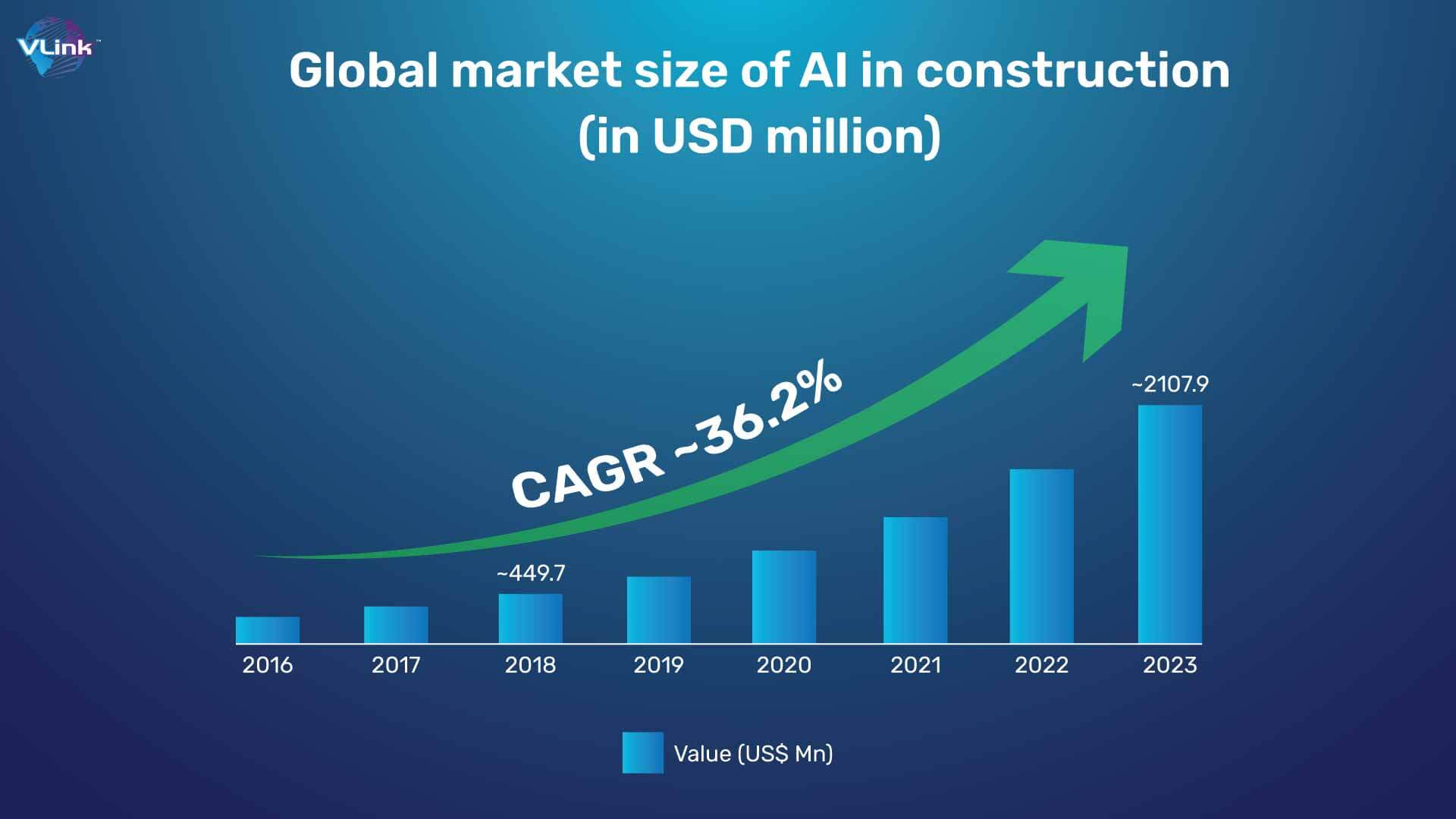
Take a closer look at the top crucial ways of utilizing of AI in construction industry for extreme benefits:
- Planning & Design
AI is reshaping the landscape of project planning and design. It processes vast amounts of data, yielding more efficient and meticulously thought-out designs. This goes beyond aesthetics; it also factors in environmental concerns and preemptive issue anticipation, optimizing project layouts.
- Risk Assessment
AI's predictive analytics play a pivotal role in enhancing safety in construction by evaluating potential site risks. It proactively identifies risks in advance, significantly reducing unforeseen incidents and accidents.
- Resource Management
Efficient resource management is the cornerstone of a streamlined construction process. It involves optimizing the use of materials, labor, and time. This approach enhances productivity, cuts down costs, and ultimately leads to better profitability.
- Quality Control
AI ensures adherence to industry standards and maintains the desired quality levels. This commitment results in minimal defects and costly rework, saving time and resources.
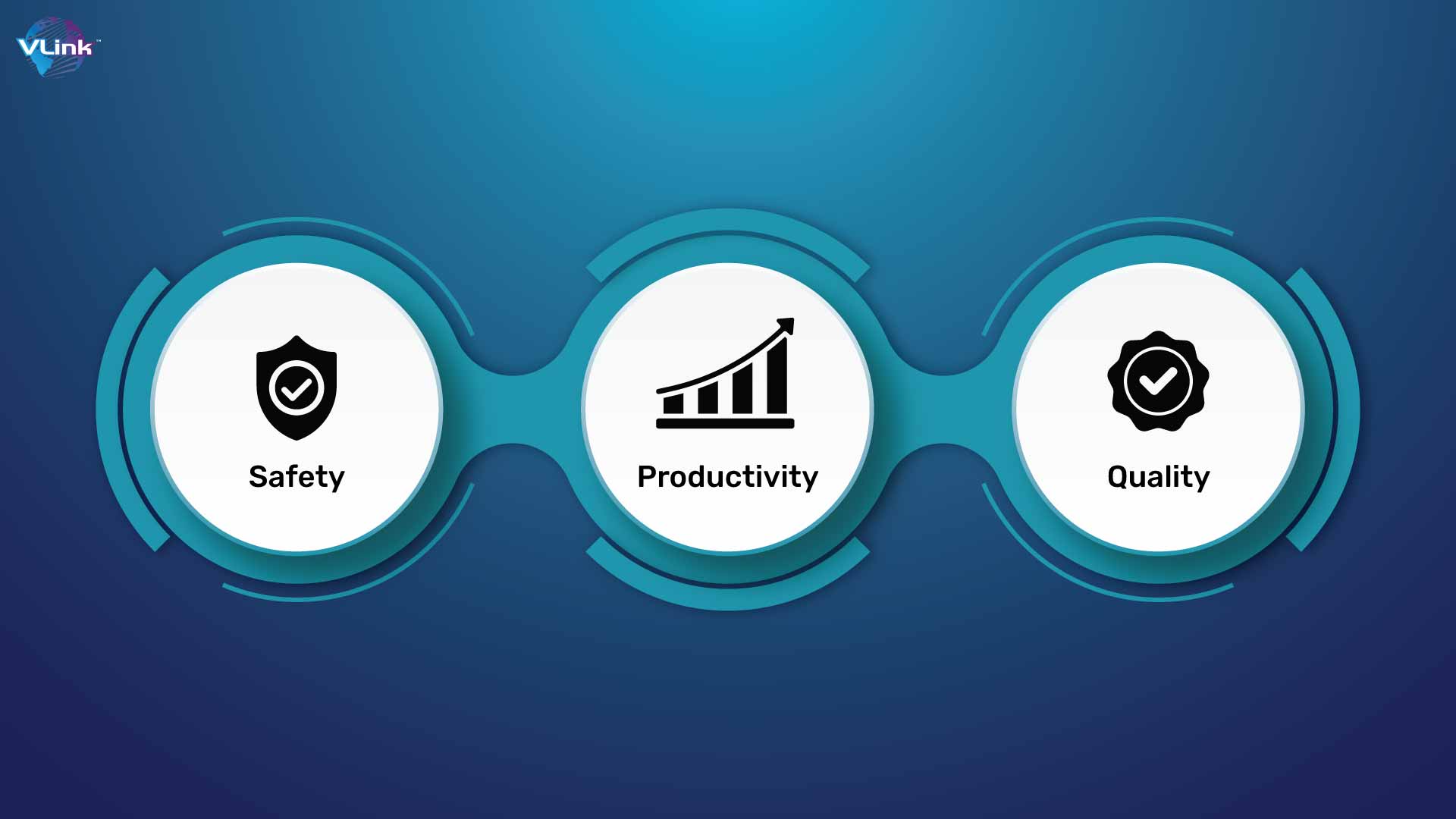
- Autonomous Machinery
Powered by artificial intelligence, machines that drive themselves are becoming more and more abundant. Thanks to their autonomous operation, they can reduce the demand for human workers while improving productivity. Their ability to function continuously day and night is also making construction projects much faster.
- Building Information Modeling (BIM)
Integrated with AI, BIM creates detailed 3D models of construction projects. This aids in precise design, clash detection, and the efficient utilization of resources, all of which contribute to improved project outcomes.
- Energy Efficiency
AI optimizes building designs to enhance energy efficiency. Its algorithms assess energy consumption and suggest improvements, resulting in sustainable and eco-friendly buildings.
- Safety Enhancement
Safety is paramount in construction, and AI plays a crucial role in ensuring it. AI continuously monitors construction sites for potential hazards, guarantees the enforcement of safety protocols, and even provides real-time alerts to workers regarding unsafe conditions.
Challenges That AI Solves for Construction Businesses
Artificial Intelligence (AI) is a game-changer for the construction industry, addressing numerous challenges that have long plagued construction businesses. Here are some of the key challenges that AI is helping to solve:
1- Project Delays
- Challenge: Construction projects are often delayed due to unforeseen issues like weather conditions or material shortages.
- Solution: By analyzing data and historical project information, AI can predict any potential delays before they happen. From there it provides insights and recommendations on how to mitigate these risks ensuring projects stay on schedule.
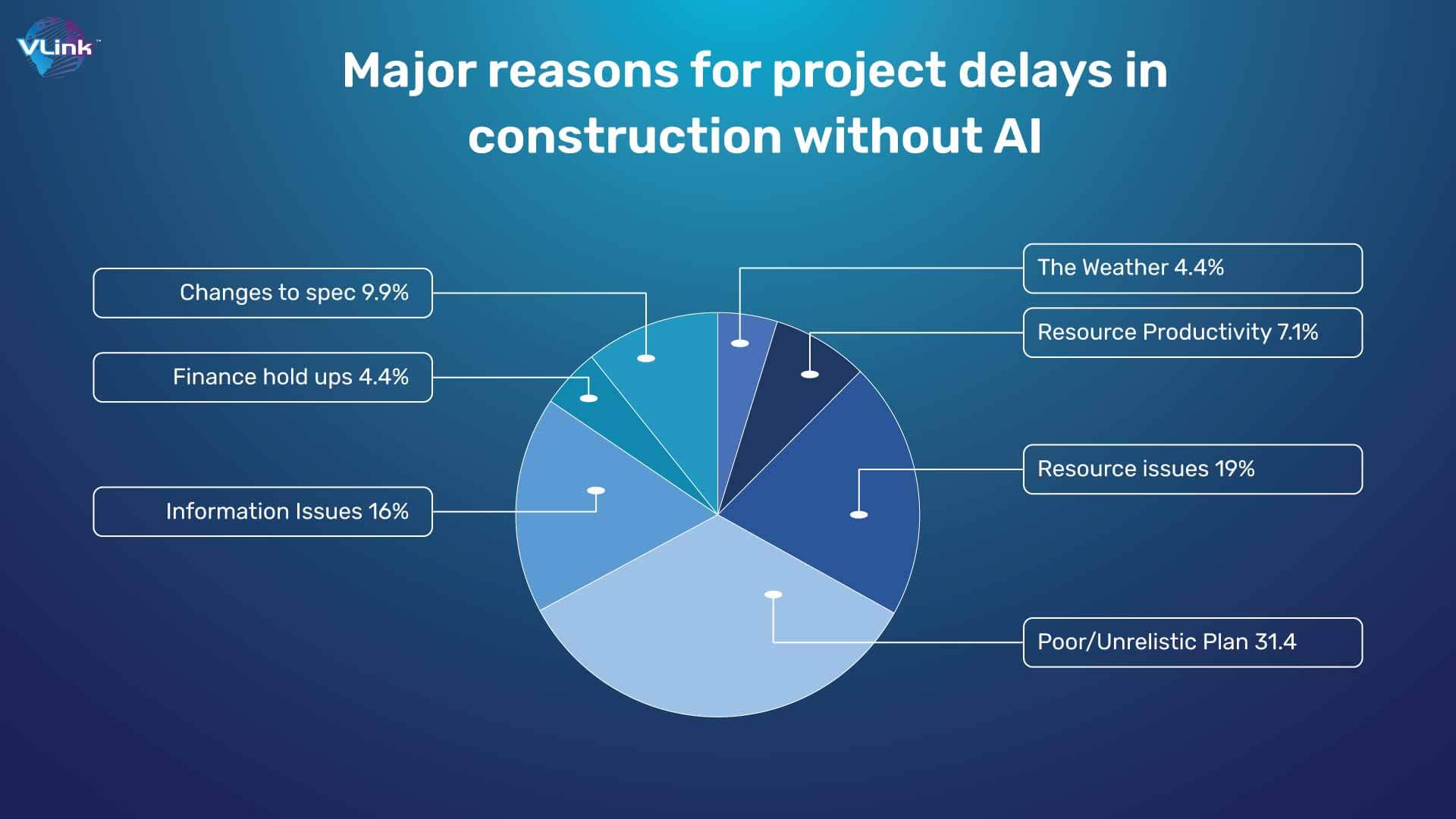 2- Resource Management
2- Resource Management
- Challenge: Poor resource allocation can cause materials, time and labor to be wasted.
- Solution: AI can optimize the way resources are managed by analyzing a project’s requirements and availability. Enabling it to allocate things efficiently. It reduces costs by making sure nothing is wasted.
3- Quality Control
- Challenge: Making sure that quality is consistent across different construction projects can be difficult.
- Solution: With an AI driven system, you don’t have to worry about it. These things monitor construction quality in real-time, identify defects or anything that deviates from design and standards to make sure that everything comes out of the project with superb quality.
4- Safety Hazards
- Challenge: Construction zones are very dangerous; this is why safety is so important.
- Solution: AI has found itself another job as a safety monitoring device. It can predict hazards in advance, monitor worker safety, and even automate protocol for cases where an accident might take place.
5- Error handling
- Challenge: Correcting design errors gets expensive and takes up a lot of time during construction.
- Solution: A very smart building information model (BIM) enhanced by AI has no trouble catching clashes and design errors early in the process. Once it detects a problem it’ll also suggest improvements making the design process easier and faster.
6- Cost Overruns
- Challenge: Inaccurate budgeting and unforeseen costs are a deadly duo that often leads to cost overruns in construction.
- Solution: By analyzing historical data and project-specific factors, AI is able to help with accurately estimating costs and managing budgets. This lessens the likeliness of budget overruns.
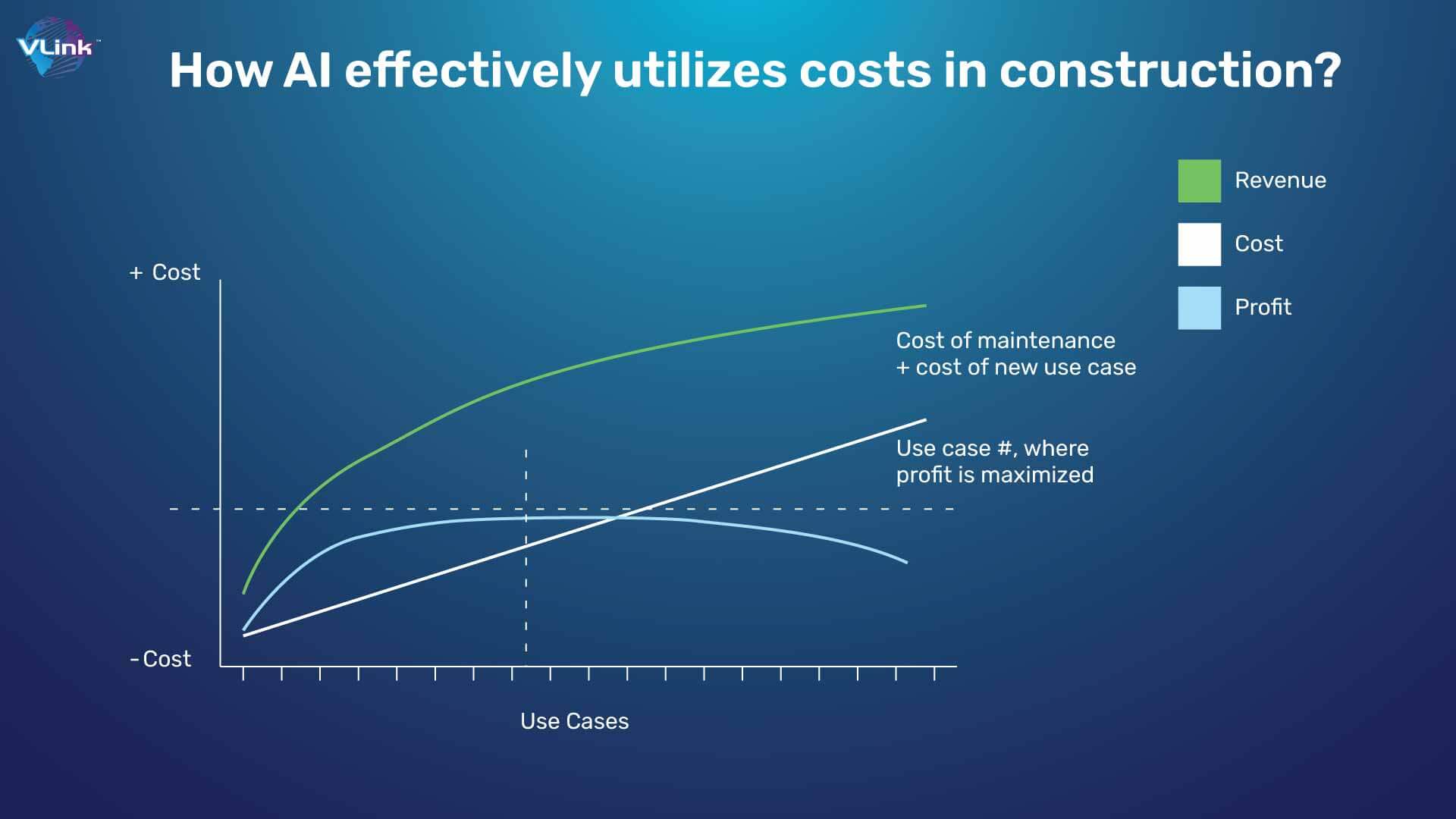 7- Environmental Impact
7- Environmental Impact
- Challenge: Construction leaves some big footprints on the environment due to how many resources it uses and wastes it creates.
- Solution: AI can optimize resource usage by suggesting sustainable materials and practices. Doing so will not only reduce waste but also the overall impact construction projects create.
8- Data Overload
- Challenge: It’s a no-brainer that construction projects create way too much data for humans to manage.
- Solution: Instead of overwhelming professionals by throwing all this data at them, AI processes it efficiently. It then analyzes it and provides them with actionable steps that they can take based on this information. This helps them make better decisions throughout the project.
9- Predictive Maintenance
- Challenge: Equipment breakdowns can lead to costly downtime and project delays.
- Solution: AI predicts maintenance needs for construction equipment by analyzing equipment data. This proactive approach reduces equipment failures and downtime.
The technology has become an indispensable tool in the construction industry, offering data-driven insights integrated with AI, optimizing resource allocation, enhancing safety, and promoting sustainability. It's a transformation that's shaping the future, making industry smarter, more efficient, and environmentally responsible.
Use cases of AI in construction industry
The construction industry has used artificial intelligence in many ways to speed up work and create better outcomes. Here are some of its uses:
- Optimized Resource Allocation
AI manages resources by looking at the amount needed for a project and how much is available. It ensures that everything is used efficiently so costs are reduced.
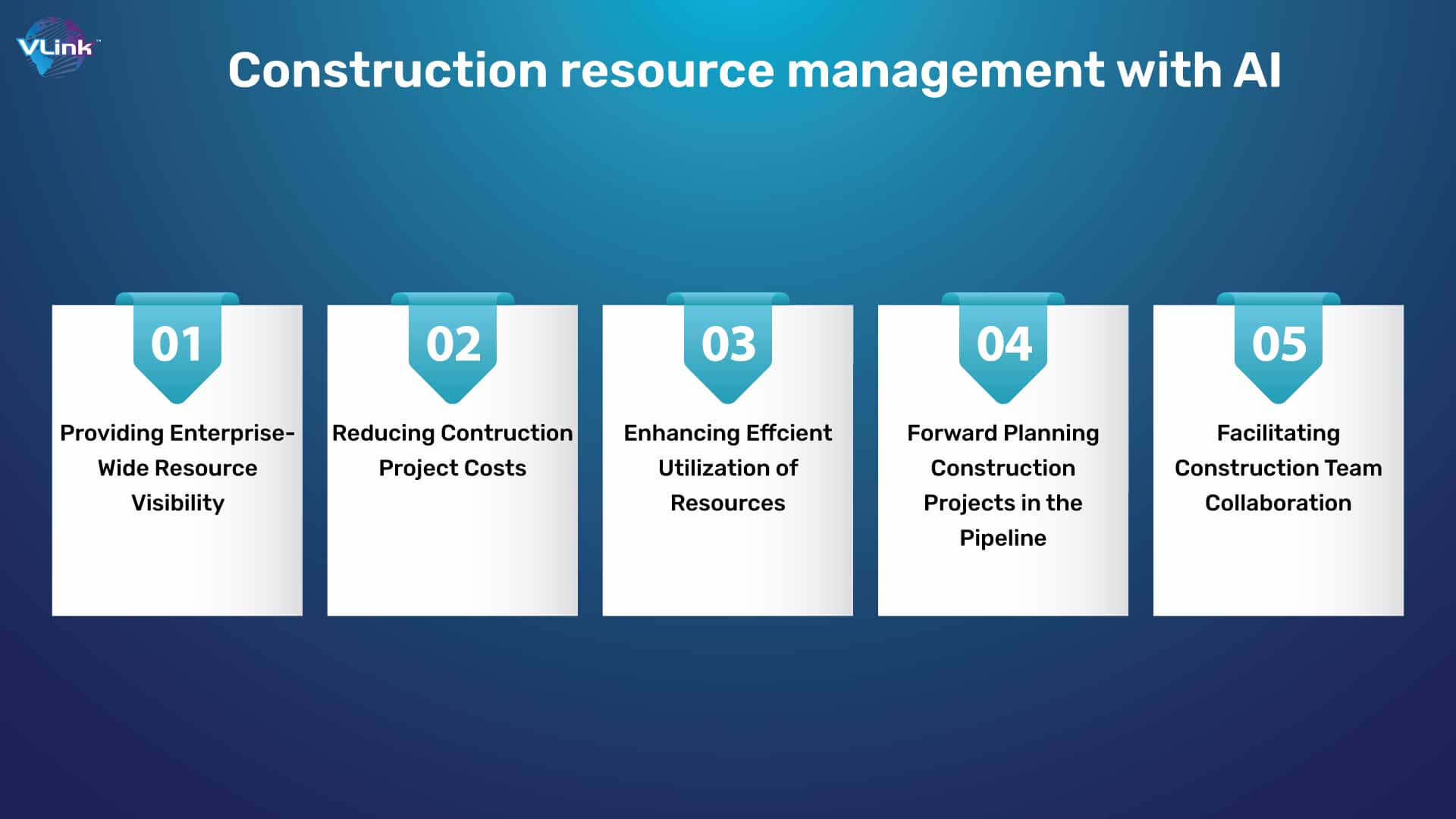
- Quality Control & Defect Detection
Image recognition and sensors have given AI the ability to scan buildings to ensure there are no defects or deviations from design and standards.
- Equipment Monitoring in Real-time
Conventional machines need maintenance and repair but it’s hard to know when. But with AI we can determine this based on the health and performance of our equipment.
- Data Management & Analysis
AI efficiently processes and analyzes the vast amounts of data generated by construction projects. This leads to actionable insights into better decision-making.
- Budget Management & Cost Estimation
AI uses historical data and project-specific factors to provide accurate cost estimation and budget management, reducing the risk of cost overruns.
- Predictive Analytics for Project Delays
- AI's predictive capabilities analyze project data to forecast potential delays. This allows construction professionals to take proactive measures to mitigate risks and keep projects on schedule.
 Safety Monitoring & Hazard Prediction
Safety Monitoring & Hazard Prediction
AI enhances safety by predicting safety hazards through data analysis. Wearable devices with AI capabilities monitor worker safety, sending real-time alerts in case of accidents or hazardous conditions.
Top AI trends in construction industry
As technology continues to advance, the construction industry must adapt and evolve. Embracing AI in construction is not just a trend; it's a transformation that's shaping the future. Here's what you can expect in the coming years:
- Internet of Things (IoT) Integration
IoT devices are becoming integral to construction sites. These devices, combined with AI, provide real-time data on various aspects of a project, such as equipment health, energy consumption, and worker safety. This data empowers construction professionals to make informed decisions quickly.
- Advanced Robotics
Robotics equipped with AI capabilities are taking on more tasks in construction. From bricklaying robots to autonomous heavy machinery, these robots are not only efficient but also enhance safety by reducing the need for human workers in dangerous tasks.
- Virtual & Augmented Reality (VR & AR)
VR and AR technologies, combined with AI, are transforming the design and review processes. They allow stakeholders to immerse themselves in 3D models of the construction project, facilitating better design reviews and enabling remote site inspections.
- 5G Connectivity
The rollout of 5G networks is a game-changer for construction sites. With ultra-fast, reliable internet connectivity, data can be shared and analyzed in real-time, allowing for quicker decision-making and seamless collaboration among team members, regardless of their physical locations.
- AI-Driven Sustainability
Environmental concerns are becoming increasingly significant. AI will play a pivotal role in optimizing construction projects for sustainability, reducing waste, and promoting the use of eco-friendly materials. This will align construction with global efforts to combat climate change.
VLink’s AI solutions to boost your construction business
The journey of integrating AI into the construction industry is ongoing, and it is a road paved with endless possibilities. From safer construction sites to sustainable buildings, artificial intelligence is driving innovation. It is not a matter of if AI will transform the industry, but how quickly and effectively it will do so.
Frequently Asked Questions
Artificial intelligence (AI) can analyze materials used, project requirements, and suggest methods to minimize waste, leading to eco-friendly construction. While the initial investment can be high, AI's long-term benefits often outweigh the costs. Many AI solutions can be tailored to fit smaller budgets.
Innovations include smart helmets, exoskeletons, and real-time safety analysis tools that significantly enhance safety on construction sites. AI can also enhance accuracy by providing real-time insights, optimizing project plans, and predicting potential issues.
Begin by identifying specific needs, exploring AI solutions, and providing training to employees for a smooth transition. However, these are just nomenclatures, the actual briefing is vast for each process. The technology will enhance the operations at every phase from planning to finalizing the architecture.







